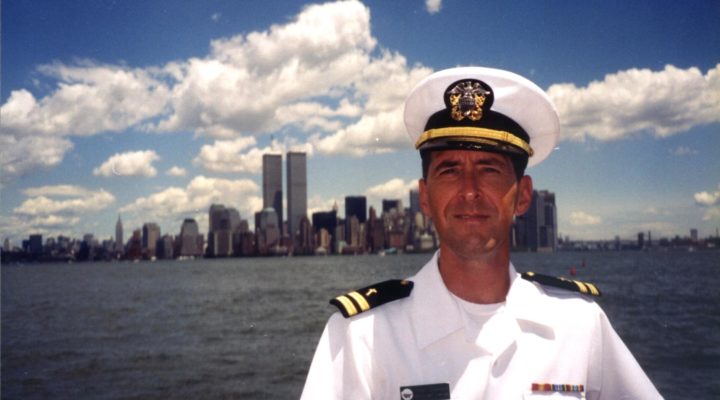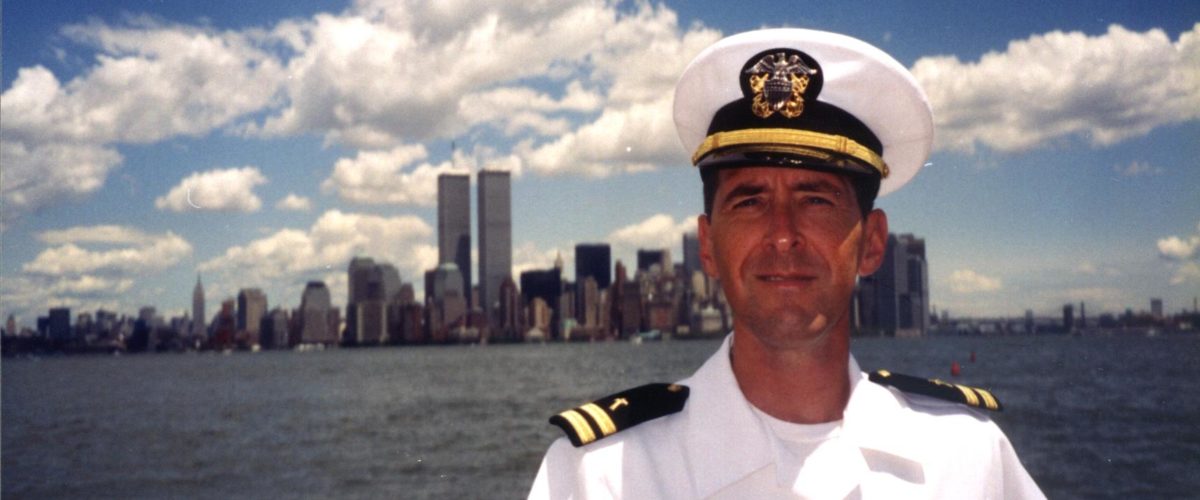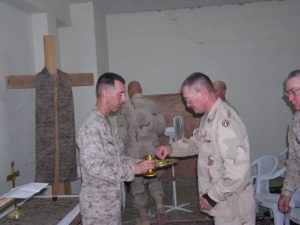Navy Reserve Capt. Terry Eddinger will reach a career milestone Oct. 4 when he is promoted to the rank of rear admiral.
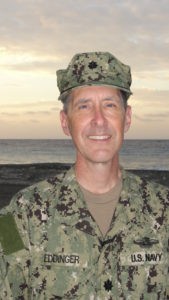
Navy Reserve Chaplain Terry Eddinger. (All photos courtesy of U.S. Navy)
This also will be a landmark for the Cooperative Baptist Fellowship as Eddinger is the first CBF-endorsed military chaplain to achieve flag rank.
The North Carolina native already has been appointed to deputy chief of chaplains for reserve matters — his 21st assignment in 25 years in the Navy.
Those postings include service with a naval hospital, the Seabees, the now-decommissioned USS John F. Kennedy aircraft carrier, a U.S. Coast Guard district, several Marine Corps units and a stint at the Guantanamo Bay detention facility in Cuba.
His service with the Leathernecks took him to Iraq during Operation Iraqi Freedom. During the deployment he conducted religious services in a war zone and ran a school supplies drive that netted 12,500 items for Iraqi children.
“That was probably one of the most challenging times that I have had, and to some degree some of the most rewarding,” he said.
But Eddinger has earned his Baptist stripes, as well. He earned a bachelor’s degree from Gardner-Webb University, a master of divinity degree from Midwestern Baptist Theological Seminary and a doctorate in Old Testament archaeology and Near Eastern history from Southern Baptist Theological Seminary. He currently teaches Sunday school at First Baptist Church in High Point, N.C.
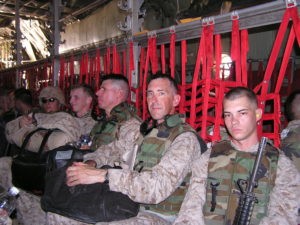
Chaplain Terry Eddinger, second from right, aboard a military cargo aircraft.
He was commissioned a naval officer in 1995, the same year he completed his Ph.D.
Parallel to his military career, Eddinger taught Old Testament for 19 years at the Carolina Graduate School of Divinity, which closed in 2016. He now holds civilian positions with the U.S. Agency for International Development and the Office of Military Commissions.
Eddinger spoke with Baptist News Global about his Navy and academic careers and about what it will mean to wear stars to his collar.
What was your church life like growing up, and what kind of church did you attend?
We went to church probably two to three Sunday mornings a month until I was 15 or 16, when I became much more active. It was a small, country Baptist church.
When and how did you first sense a calling on your life?
I was studying to be a physics major at the time and was working to that end. I switched gears. I felt a sense that was what I was supposed to do. It wasn’t a particular type of job or calling, like being a pastor. It was just a calling to do ministry. It was nonspecific.
What led you to study the Old Testament?
Quite honestly, I knew Hebrew better than I knew Greek. I can work in Hebrew, Greek and Aramaic, but my Hebrew was better than my Greek by a long shot.
You were finishing Old Testament studies when you began to pursue military chaplaincy. What inspired that?
When I was at Midwestern Seminary back in the late ’80s, there was a guy there who was a ship driver, a lieutenant. He was studying to be in the ministry. And there were four other folks in my class who all joined the military right after that. And I had a roommate there at the seminary. He was an older guy who had a son who was an F-14 pilot on the USS Ranger. The Gulf War was happening, and his son was flying combat missions.
I had a lot friends who were interested in it. I was interested in it. And I thought, when I get out to be a professor, Navy Reserve chaplaincy would be a good counterbalance to being an academic in that it would provide some practical ministry.
Were you commissioned as a CBF-endorsed chaplain, or did you come over from the SBC?
I was by SBC. CBF was not endorsing chaplains at that time. Not in 1995. They didn’t start until about 2000. Somewhere around there is when I switched over. I know I was among the first 100.
Are the units you serve as a chaplain like congregations to you?
They really are. Quite personally and honestly, I have never felt called to be a pastor of a church. I am an academic by nature. I did that for 19 years. When I was in Iraq, I did liturgical Protestant services on Sunday mornings. That was my congregation. I led a similar service on the aircraft carrier on Sunday mornings.
In GTMO (Guantanamo Bay) there were four other chaplains on the base. My job was to get out and be with the folks and provide ministry in creative and different ways. You always have a congregation.
“You don’t have to be the one doing the work to add value to the work that’s being done.”
Is there a pastoral role in administration?
There is because you’re helping the junior chaplains and the RPs (Religious Program Specialists) do their jobs. It’s all part of a team. You don’t have to be the one doing the work to add value to the work that’s being done. If you’re back helping your chaplains to be ready to mobilize, to be prepared mentally spiritually and physically — they need that to do their job.
What have you seen or heard in uniform that has deepened your Christian faith?
Seeing faith in other folks around you in times of trouble or times of hardship. And believe me, in the military you can have a number of those. And maybe seeing small miracles happen when you’re praying for something and it happens. Like helping the kids in Iraq. You see it coming together and touching the lives of the kids and touching the lives of the adults, and the Marines. There is a miracle in that, too.
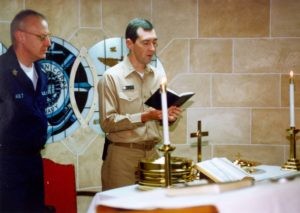
Then-Lt. Terry Eddinger conducts a Protestant service.
In what ways will your ministry and life change with this promotion?
It will get more hectic. At this level, the room for error goes to almost zero. And I have to be more careful in what I say and more careful what I do. As an admiral your words have a bigger impact. If you tell a sailor they are doing a really good job, it means one thing if their buddy tells them that and it means another if an admiral tells them that. Positive or negative, your words will have more weight.
A favorite story or character in the Old Testament?
What I like about the characters in the Old Testament is that none of them are perfect and we are supposed to learn from them, whether they are doing good things or making mistakes. I think the passage I like is in Isaiah 40: “They will soar on the wings of eagles.” But there also is the Micah passage, “Do justice, love mercy and walk humbly with your God.”
And there are a lot of good examples. Joseph is a good example. He becomes a leader, unintentionally. He didn’t plan it. But he does it with wisdom and certainly with some mercy when it comes to his brothers. And he does not hold a grudge.
Related articles:
Q&A with Gerry Hutchinson on chaplaincy, COVID and banjoes
Chaplains struggle to provide ‘ministry of presence’ in time of social distancing

